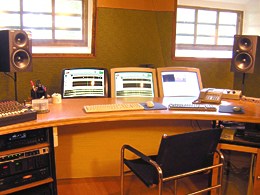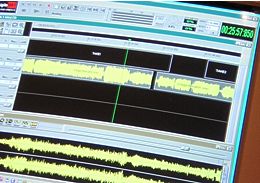


The computers are housed in a custom made, ventilated soundproof cabinet which keeps background noise to a minimum.
Monitoring is via Mackie HR 824s, and for mastering and editing we have a complete Tripledat system with Firewalker and Osiris plug ins, as well as Soundforge with many other powerful plug-ins to cover all eventualities.
This system is fast, intuitive and produces great results.
Unattended
:
If you are basically happy with your mixes we will normalise, "top and tail"
the songs, make the CD as loud as possible without squashing the music and
write a PQ'd Red Book standard CD master. We won't EQ, enhance or make any
other artistic decisions on your behalf, as you've probably sweated blood
over the mixes and it would not be appropriate for us to make those sort of
decisions without your approval.
Sometimes
it's not just music that needs enhancing. We are frequently asked to "clean
up" a badly recorded speech tape, with the aim of removing the background
noise and making it clearer to understand.
We have
various powerful tools like de-noisers and de-hissers to help with that task
and it is nearly always possible to help, sometimes to a remarkable degree.

Attended
:
You will be present at the session and this is where the fun begins! As well
as the above items, we have a large collection of audio tools to correct and
enhance including equalisers, compressors, limiters, enhancers, pitch shift,
time stretch, stereo "widening," denoisers,
declickers, and many others. Cost: £35 per hour.
Transfer
old Tapes to CD :
If you
have tapes, vinyl records or even 78s, we can copy these old tapes to CDs
(or DVDs) for you. Transfer and archiving is possible between the following
formats and machines :
Soundcraft 24 track 2", at 15 & 30 i.p.s.
Sony DT55ES DAT player
Nakamichi MR1 cassette deck
Sony JE 520 mini disc player
Sony PCM501 + Betamax recorder
Various CD players
Otari 5050B11 ¼" deck
Revox A77 ¼" deck
Akai 4000 DS ¼" deck
Record deck 33 1/3, 45 and 78rpm
Baking Tapes :
Back in the 1970's several of the major tape manufacturers changed the chemical formula of the backing material used on their tapes. Unfortunately, over time this has proven to have had an unfortunate side effect - when you try and play them, the backing material comes off over the tape heads and guides and everything grinds to a gluey halt!
This is known as "sticky shed" syndrome. Fortunately, however, there is a relatively simple solution which involves sending the tapes away to a specialist company (we usually recommend a company called Sandelco - 01189 819898 ) to be baked. They are literally baked in an oven at a specific temperature for a pre-set time, and this temporarily drives out the moisture that causes the problem without damaging the tapes. A normal domestic oven is unsuitable for this as the temperature cannot be controlled accurately enough, so please don't try it at home!
Once baked, you've then got about 4 to 6 weeks of stability to transfer them to another format (usually 24 bit digital these days) before they begin to deteriorate again.
Although this nearly always works very well, there will come a point when some tapes have deteriorated too much to be saved. Although certain record companies (like EMI / Abbey Road) store their tapes very carefully, it is a matter of some concern that others who hold rare and valuable material in their archives may be blissfully unaware of this ticking timebomb. When the time comes for the material to be transferred across to the next new format, it may no longer be possible.
If you are storing tapes from this era and are concerned about their longevity, you might want to think about getting them copied and digitally backed up whilst it is still possible. Also, as time passes it's becoming harder to get hold of working versions of the older machines that the tapes were originally recorded on.